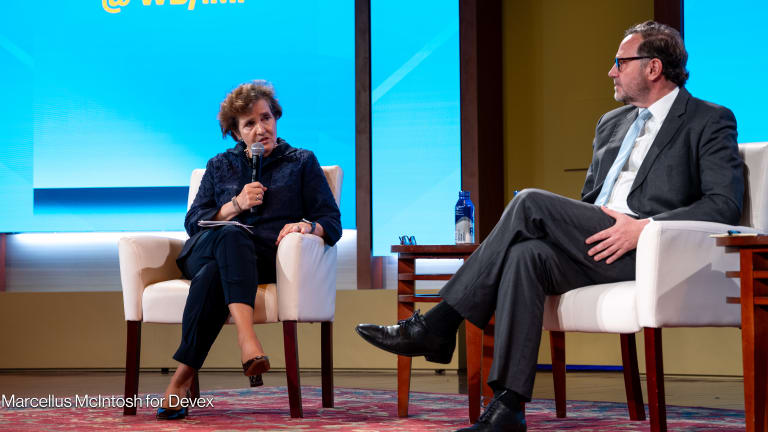
WASHINGTON — In a brief nomination hearing Tuesday, senators on the Committee on Foreign Relations asked Sean Cairncross, the nominee for chief executive officer of the Millennium Challenge Corporation, to outline his relevant credentials — which some in the development community have questioned.
Cairncross, the deputy assistant to the president and senior adviser to the White House chief of staff, is a lawyer with a long history of working for the Republican party. He has served as the chief operating officer of the Republican National Committee and deputy executive director and general counsel to the National Republican Senatorial Committee.
MCC CEO nominee would bring political ties, but some question expertise
Following the announcement of Sean Cairncross as the nominee for chief executive officer of the Millennium Challenge Corporation, some in the development community questioned his expertise, but others said the agency needs leadership after a year in a holding pattern, and that Cairncross' political connections could help the agency.
In his opening statement at the hearing, Cairncross said he has had an interest in foreign affairs since he was a boy and studied international affairs both as an undergrad and for his master’s degree. He talked about his experience overseeing hundreds of employees and large budgets and bearing responsibility for reporting and compliance in complex systems in the committee posts. He told the senators that background in management would serve him well if he were to be confirmed as CEO of MCC.
Cairncross also said that since he joined the White House in January 2017, he has gained a “practical respect for American soft power.”
Sen. Todd Young, a Republican from Indiana, who chairs the Senate Foreign Relations Subcommittee on Multilateral International Development, Multilateral Institutions, and International Economic, Energy, and Environmental Policy, asked Cairncross what professional qualities prepared him for the job. Cairncross said his management experience overseeing two organizations that were subject to enormous scrutiny and accountability is a transferable skill.
Sen. Jeff Merkley, a Democrat from Oregon, the ranking member of the subcommittee, pushed Cairncross more about relevant experience, asking him about his specialization in his studies of foreign affairs and if he’d taken any courses related to “third world economic development.” Cairncross replied that he’d focused on intelligence and took one international economics course at Cambridge University that discussed developing nations as part of the course. Cairncross has not lived in a developing country, has not been to any of the countries where MCC has compacts, and does not speak a foreign language, he said.
If he were to be confirmed, one of his first priorities as CEO would be to travel and see MCC’s work on the ground, Cairncross said.
Merkley raised a few other issues with Cairncross. The Senator said he had heard that the administration was considering plans to expand the number of political appointees at MCC from eight positions to more than two dozen and expressed concern about that decision, asking Cairncross where he stands on the issue.
Cairncross said he was not familiar with those plans, but that “if confirmed, I will strive to keep MCC performance-based, professional organization” and that he is “not looking to politicize MCC.”
There have been concerns emerging about diversity at MCC. Foreign Policy reported that Sen. Bob Menendez called on the organization to explain “troubling” racial comments made by MCC Vice President of Compact Operations Robert Blau — a political appointee — at a town hall meeting in June. More generally, diversity is on the decline in MCC and in other agencies. Merkley asked Cairncross about his own views of diversity and a lawsuit the RNC settled about racial bias during his time there.
“I believe diversity should be a celebrated thing, it enhances the work environment, particularly in an agency like MCC, it leads to better decision-making,” he said, adding that he would seek to grow diversity.
Cairncross outlined three priorities he would pursue at MCC: Maintaining the agency’s model and strong track record of accountable results, he would seek to deepen bipartisan support for the agency; relying on its “deeply knowledgeable, talented, and diverse staff,” he would try to increase collaboration with other U.S. agencies and companies to tap both private sector and domestic partner country resources; and help “realize” regional compacts.
Congress is considering a bill that would allow MCC to do regional compacts. “If carefully done and done in a focused manner, there is great potential there,” Cairncross said.
Young asked about the weight he will place on scorecard performance versus a country’s strategic importance to the U.S. Cairncross said that MCC “has a great track record of success because it’s adhered to a very objective model in country selection, those criteria, those eligibility criteria on good governance, economic freedom and investment in the people are key to the agency’s success. With respect to the larger strategic interest of the U.S., the way I view it is MCC isn’t necessarily deployed strategically but where it is active it serves to buttress and support U.S. strategic interests.” He also said that the board provides policy input on the criteria and that thresholds also offer an opportunity to engage with countries who are close to, but haven’t quite met the criteria.
Cairncross also said he was not involved with the muslim ban, firing James Comey, and has not been and does not expect to be interviewed by Robert Mueller.








